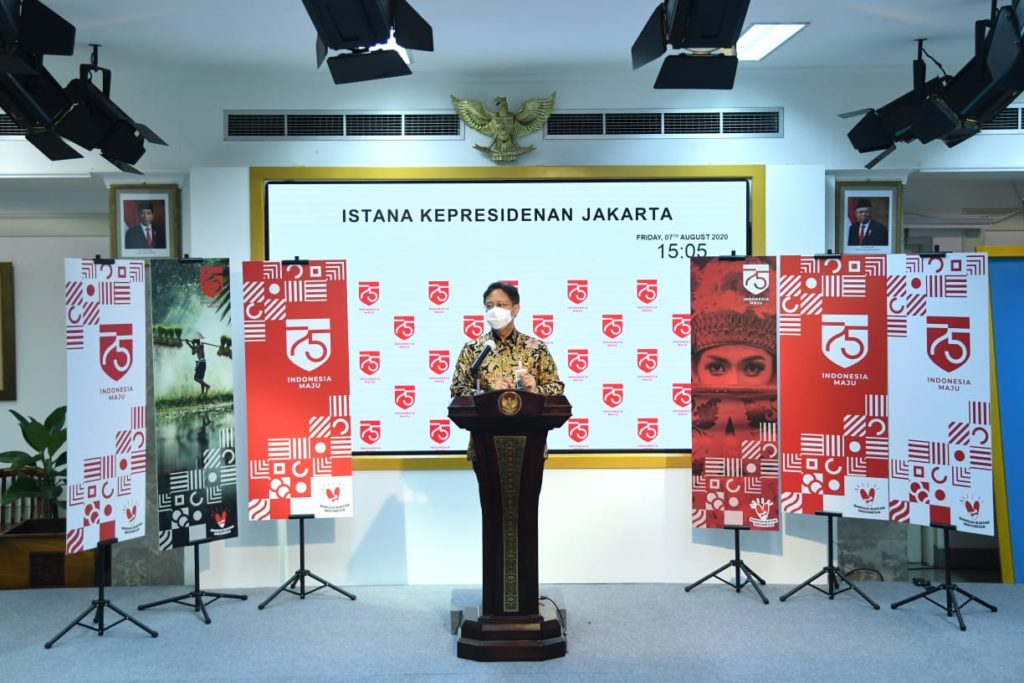Gov’t Distributes Economic Recovery Assistance

Task Force Chief for National Economic Recovery (PEN) Budi Gunadi Sadikin delivers his statement at the Presidential Palace, Jakarta, Friday (7/8). (Photo by: BPMI)
In a bid to deal with the impact of COVID-19 pandemic, the Indonesian Task Force for National Economic Recovery (PEN) has distributed assistance through several economic programs.
Task Force Chief for National Economic Recovery (PEN) Budi Gunadi Sadikin stated that the effort aims to accelerate the rotation of the national economy.
“The President gave his directive to as soon as possible boost the economy through the PEN budget. So that in the third quarter it can be realized,” Budi said at the Presidential Palace, Jakarta, Friday (7/8).
The Task Force has three main focuses including Social Assistance Program, the Micro, Small, and Medium Enterprises (MSMEs) Program, and the Labor Intensive Program.
“On the Social Assistance Program, there is Family Hope Program which will be given to the poorest 10 million families. Or, if you multiply it by 4, there are 40 million poorest families,” Budi continued.
The budget ceiling for the program reaches Rp37.4 trillion. As of August, Rp27 trillion or 72% of the budget ceiling has been disbursed. The figure is expected to reach 100% by the end of the year.
The second program, Staple Food Card Program, has the budget ceiling of Rp43.6 trillion with total recipients of up to 20 million families. Budi stated that if the number is multiplied by 4, there are 80 million of the poorest. “As of August, the absorption realization has reached Rp26 trillion or about nearly sixty percent (59%) of the budget ceiling,” he continued.
The third program is the Cash and Non-Cash Social Assistance Program which is targeted at areas in Greater Jakarta and the surrounding affected by Covid-19. The budget ceiling reaches Rp39.2 trillion with the realization of Rp19 trillion or 49% absorption. The total number of recipients reaches 10.9 million families.
The Village Fund Direct Cash Assistance (BLT) program, the fourth program has a budget ceiling of Rp31.8 trillion with 8 million recipients. However, he admitted that the absorption of 27% was still below the target.
“So, only Rp9 trillion has been disbursed until now. That is what we are after,” Budi stated.
Meanwhile, there are 2 major programs for the MSMEs Program, one of which is the MSMEs Interest Subsidy Program. The budget ceiling for this program is Rp 35 trillion. However, until now, Budi admitted that only Rp1.3 trillion or 3.71% has been disbursed. “Still very far from the target of 35 percent,” he said.
He also stated that this issue has been discussed with Ministry of Cooperatives and MSMEs, Ministry of Finance, Pawnshops, and banks member of the Association of State-owned Banks (Himbara) as well as Pemodalan Nasional Madani as program implementer.
“We notice that (Rp)1.3 trillion has reached 13 million MSMEs and has subsidized loans of (Rp)204 trillion,” he said. The realization has reached almost all MSMEs in the banking system. The realization results provide an opportunity for the Task Force to expand the MSMEs-based program.
The budget for the other MSMEs-based program, the Fund Placement Program reaches Rp79 trillion. Of that amount, the realization distributed by Himbara banks has reached 38% or Rp35 trillion. It also reached more than 620 thousand MSMEs and loans amounted to Rp35 trillion.
Currently, the Task Force and Ministry of Finance are reviewing the remaining unused budget. It is expected to be distributed through regional banks. “This is so that the distribution of the Fund Placement Program can be more evenly distributed to all regions in remote areas of Indonesia,” he explained.
In addition, there is also a Labor Intensive Program with a budget ceiling of Rp18.4 trillion. The absorption reaches 45.7% which absorbs 3 million workers and is mostly done by Ministry of Public Works and Public Housing.
The Task Force also prepared a Salary Subsidy Assistance Program. The criteria for beneficiaries are formal workers who receive income below Rp5 million and are recorded in the Workers Social Security Agency (BPJS Ketenagakerjaan).
“Formal workers who are still registered as working in companies, still officially pay the BPJS dues, but because the condition of the company is not good, they have been sent home, some of them have had their salaries cut,” Budi said.
According to the Chief, the number of workers in this segment reached 13.8 million workers. Each of them will receive the assistance of Rp600 thousand a month for four months in 2020. The assistance will be distributed in the third and fourth quarters.
“The assistance will be sent directly to the accounts of workers registered at the BPJS,” he said. The total funds budgeted amounted to Rp33.1 trillion. (Communication Team of the Covid-19 Handling Committee and PEN/EN)
Translated by: Fairuzzamani Inayatillah
Reviewed by: Yuyu Mulyani








